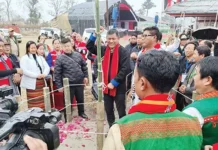ITANAGAR, Mar 8: The National Bank for Agriculture & Rural Development (NABARD) has sanctioned Rs 33619.50 lakh to the Government of Arunachal Pradesh under its Rural Infrastructure Development Fund (RIDF) during 2017-18 as against the normal allocation of Rs 25000 lakh earmarked for the current year for the state.
This year’s sanction of Rs 33619.50 for creation of 27 rural infrastructure projects is 132 per cent higher than last year’s sanction of Rs 25547.78 lakh towards 21 rural infrastructure projects.
The sanctioned fund is for construction of 21 new roads, two rural bridges, four drinking water supply projects, involving NABARD assistance of Rs 27724.50 lakh, Rs 2250.00 lakh and Rs 3645.00 lakh respectively.
Welcoming NABARD’s gesture, Chief Minister Pema Khandu in a statement on Friday stated that the relationship between the Government of Arunachal Pradesh and NABARD, particularly during the last one-year has been wonderful.
He thanked the NABARD Arunachal Regional Office for its significant support to the state government.
He also appreciated NABARD for supporting more than 500 awareness programmes, channelizing subsidy for three flagship programmes of the state government, in addition to other central sector schemes.
He lauded NABARD for its contribution during pre-budget planning exercise of the state government by giving special focus for budgetary support to develop the agri and allied sectors of the state.
It may be mentioned that financial assistance from NABARD under RIDF to the state of Arunachal Pradesh for creation of Rural Infrastructure was started in the year 1999-2000. With this year’s sanction of Rs 33619.50 lakh, the cumulative sanction from NABARD to state government under Tranche V (1999-2000) to Tranche XIII (2017-18) has reached Rs 179910.89 lakh for construction of 186 rural infrastructure projects.
The completion of the mentioned projects would help the state government achieve connectivity of rural road network of 1630.66 kms, rural bridges length of 4359.52 meters, 22 projects of drinking water supply with capacity of 3.34 MLD, three new schools, four projects of flood protection works and six 33KV projects for augmenting the transmission network in the state.





